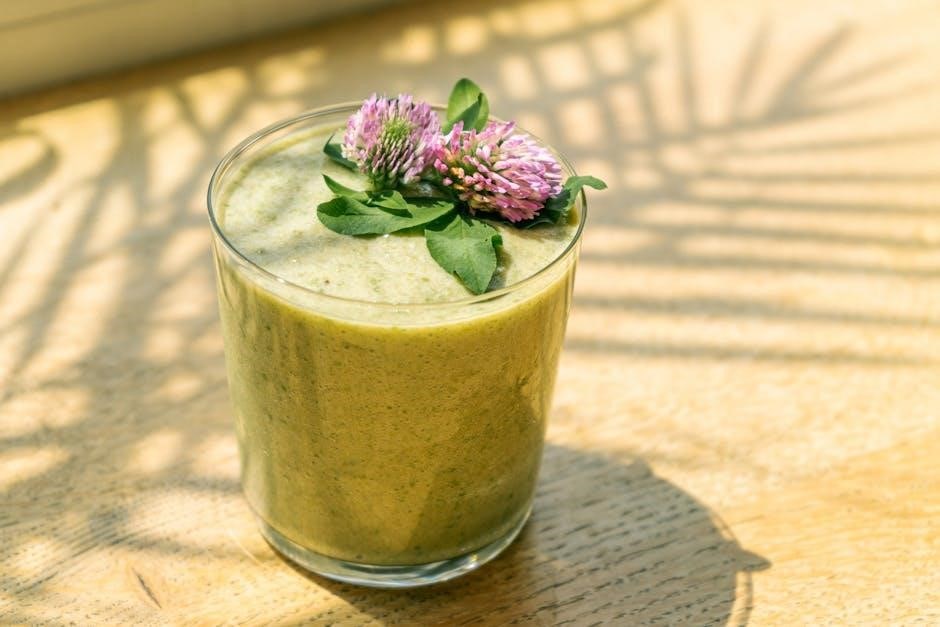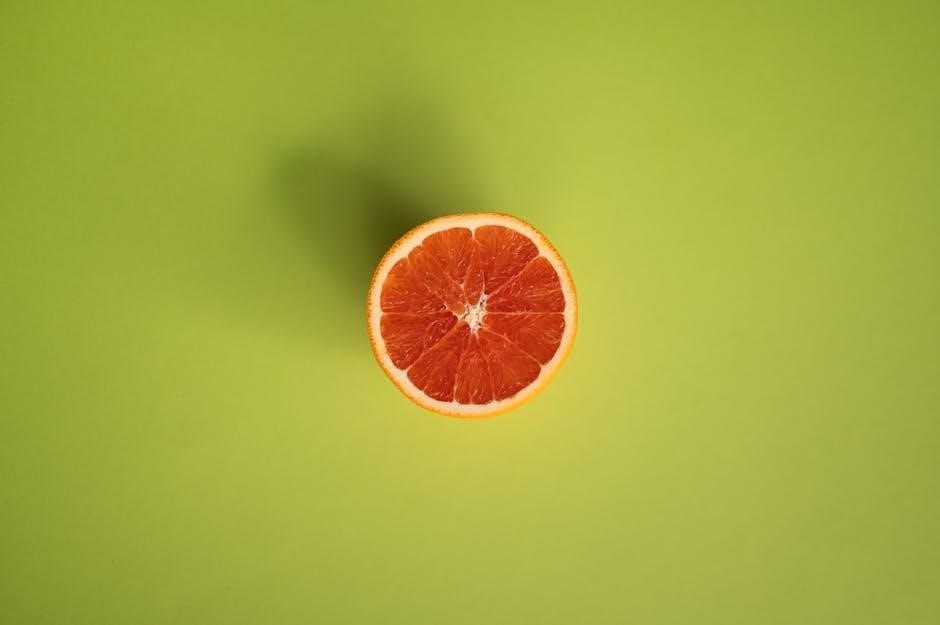cortisol detox diet plan pdf

The cortisol detox diet plan is a nutrition-focused approach designed to reduce stress hormones and promote adrenal health․ It emphasizes whole‚ nutrient-dense foods and healthy lifestyle changes to support overall well-being and natural cortisol balance․
1․1 What is Cortisol and Its Impact on the Body
Cortisol is a stress hormone produced by the adrenal glands that plays a crucial role in the body’s response to stress․ It helps regulate blood sugar levels‚ aids in metabolism‚ and supports the body’s “fight or flight” response․ Chronically elevated cortisol levels‚ however‚ can have negative effects‚ such as weight gain‚ increased blood pressure‚ and disrupted sleep patterns․ Understanding cortisol’s role is essential for managing its impact and maintaining overall health and well-being․
1․2 The Importance of Managing Cortisol Levels
Managing cortisol levels is crucial for maintaining overall health and well-being․ Elevated cortisol over time can lead to issues like belly fat‚ fatigue‚ and hormonal imbalances․ By regulating cortisol‚ individuals can improve energy levels‚ enhance sleep quality‚ and support weight management․ A balanced cortisol level also aids in reducing inflammation and promoting a stronger immune system․ This makes it a key focus for those seeking to enhance their health and prevent chronic conditions․
1․3 Overview of the Cortisol Detox Diet Plan
The cortisol detox diet plan is a structured program designed to help reduce cortisol levels through dietary changes․ It typically lasts 7–21 days‚ focusing on whole‚ nutrient-dense foods like fruits‚ vegetables‚ lean proteins‚ and healthy fats․ The plan emphasizes eliminating processed foods‚ sugar‚ and caffeine while incorporating anti-inflammatory and cortisol-lowering ingredients․ It provides practical meal ideas‚ recipes‚ and tips to support adrenal health and overall well-being‚ making it adaptable to various dietary needs and preferences․

Understanding Cortisol Detox
Cortisol detox is a dietary approach focusing on reducing stress hormones through nutrition․ It emphasizes whole foods‚ lean proteins‚ and healthy fats to support adrenal health and stress reduction․
2․1 What is a Cortisol Detox Diet?
A cortisol detox diet is a nutrition-focused plan designed to lower cortisol levels through dietary adjustments․ It emphasizes whole‚ nutrient-dense foods‚ lean proteins‚ and healthy fats while minimizing processed foods‚ sugar‚ and caffeine․ The diet aims to support adrenal function‚ reduce stress‚ and promote overall well-being․ By focusing on balanced nutrition‚ it helps regulate cortisol production‚ leading to improved energy‚ better sleep‚ and a healthier metabolism․ This approach is often combined with lifestyle changes for optimal results․
2․2 Benefits of a Cortisol Detox Diet
The cortisol detox diet offers numerous benefits‚ including reduced stress levels‚ improved sleep quality‚ and enhanced energy․ It supports adrenal health‚ helping to regulate cortisol production naturally․ By focusing on nutrient-dense foods‚ the diet promotes weight management‚ particularly in stubborn areas like the belly․ It also helps stabilize blood sugar‚ reduce inflammation‚ and improve mental clarity․ Overall‚ this diet is a holistic approach to achieving hormonal balance‚ better mood‚ and long-term well-being without extreme calorie restriction or unrealistic lifestyle changes․

2․3 How Does the Cortisol Detox Diet Work?
The cortisol detox diet works by focusing on whole‚ nutrient-dense foods that support adrenal function and reduce inflammation․ It eliminates processed foods‚ sugar‚ and caffeine‚ which can spike cortisol levels․ By incorporating healthy fats‚ lean proteins‚ and fiber-rich foods‚ the diet helps stabilize blood sugar and promote balanced hormone production․ Hydration and mindful meal timing also play a role in regulating cortisol․ This approach creates a metabolic environment that supports natural detoxification and stress reduction‚ helping the body restore its hormonal equilibrium and improve overall health․

The Foundation of a Cortisol Detox Diet
The foundation of a cortisol detox diet includes whole‚ nutrient-dense foods‚ healthy fats‚ lean proteins‚ and fiber‚ emphasizing hydration to support adrenal health and balance cortisol levels․
3․1 Foods to Include in Your Cortisol Detox Diet
Incorporate nutrient-dense foods like fruits‚ vegetables‚ whole grains‚ lean proteins‚ and healthy fats to support cortisol balance․ These foods provide essential vitamins‚ minerals‚ and antioxidants that help regulate stress hormones and promote adrenal health․ Include omega-3 rich foods‚ magnesium-rich leafy greens‚ and fiber-rich options to stabilize blood sugar and reduce inflammation․ Healthy fats‚ such as avocados and nuts‚ also play a crucial role in hormone production and overall well-being․ These foods create a balanced foundation for managing cortisol levels effectively․
- Fresh fruits and vegetables
- Whole grains like quinoa and brown rice
- Lean proteins such as chicken and fish
- Healthy fats like avocados and olive oil

3․2 Foods to Avoid During Cortisol Detox
Eliminating certain foods is crucial for managing cortisol levels․ Avoid processed foods‚ sugary snacks‚ and refined carbohydrates‚ as they cause inflammation and blood sugar spikes․ Limit caffeine and alcohol‚ which can disrupt sleep and stress responses․ Also‚ reduce intake of high-sodium foods and artificial additives‚ as they can exacerbate stress and hormonal imbalances․ These foods hinder the body’s ability to regulate cortisol‚ making it harder to achieve balance and overall well-being․
- Processed and packaged foods
- Sugary snacks and refined carbohydrates
- Caffeine and alcohol
- High-sodium foods
3․3 The Role of Hydration in Cortisol Regulation
Proper hydration is essential for maintaining healthy cortisol levels․ Water supports adrenal function‚ which produces cortisol‚ and helps flush toxins that can disrupt hormone balance․ Even mild dehydration can increase stress and elevate cortisol levels․ Aim to drink at least 8-10 glasses of water daily‚ and consider incorporating hydrating foods like cucumbers and watermelon․ Avoid sugary drinks and caffeine‚ which can dehydrate the body and worsen cortisol imbalances․ Staying hydrated is a simple yet critical step in supporting cortisol regulation and overall well-being․
- Drink 8-10 glasses of water daily
- Incorporate hydrating foods
- Limit sugary and caffeinated beverages
3․4 Importance of Meal Frequency and Timing
Meal frequency and timing play a significant role in cortisol regulation․ Eating smaller‚ balanced meals throughout the day helps maintain steady cortisol levels and prevents spikes․ Avoid overeating‚ as this can disrupt cortisol balance․ Space meals evenly to keep energy levels stable and support adrenal function․ Skipping meals can lead to cortisol surges‚ so consistency is key․ Additionally‚ aligning meals with your circadian rhythm can further support natural cortisol fluctuations‚ promoting overall hormonal balance and well-being․
- Eat smaller‚ balanced meals
- Space meals evenly
- Align with circadian rhythms
7-Day Cortisol Detox Meal Plan
A 7-day cortisol detox meal plan offers a structured approach to reducing stress hormones through nutrient-dense foods‚ promoting balanced energy and overall well-being easily․
Day 1 focuses on introducing cortisol-friendly foods that nourish your body and support adrenal health․ Start with nutrient-dense options like fruits‚ vegetables‚ whole grains‚ lean proteins‚ and healthy fats․ These foods provide essential vitamins and minerals to combat stress and balance cortisol levels․ Breakfast ideas include oatmeal with berries and nuts‚ while lunch might feature a salad with grilled chicken and avocado․ Dinner could be quinoa with steamed vegetables and a drizzle of olive oil․ Snacks like nuts and fresh fruits are perfect for in-between meals․ This day sets the foundation for a gentle‚ cortisol-lowering diet․
4․2 Day 2: Balancing Macronutrients for Cortisol Balance
Day 2 emphasizes balancing macronutrients to support cortisol regulation․ Focus on lean proteins like chicken or fish‚ healthy fats such as avocados and nuts‚ and complex carbs like whole grains and vegetables․ These foods stabilize blood sugar and provide sustained energy‚ reducing stress on the adrenal glands․ Breakfast could include scrambled eggs with spinach and whole-grain toast‚ while lunch might feature a grilled chicken salad with olive oil dressing․ Dinner options include baked salmon with quinoa and steamed broccoli․ Balancing macronutrients helps maintain energy levels and supports cortisol balance․
4․3 Day 3: Incorporating Anti-Inflammatory Foods
Day 3 focuses on anti-inflammatory foods to reduce cortisol-induced inflammation․ Include berries‚ leafy greens‚ and fatty fish like salmon‚ rich in omega-3s․ These foods help lower inflammation‚ which is linked to high cortisol levels․ Breakfast could feature a berry smoothie with spinach and chia seeds‚ while lunch might include grilled salmon with a quinoa and vegetable salad․ Dinner options include roasted turkey with sweet potatoes and steamed green beans․ Anti-inflammatory foods support adrenal health and promote a balanced cortisol response․
4․4 Day 4: Focus on Lean Proteins and Healthy Fats
Day 4 emphasizes lean proteins and healthy fats to stabilize energy and support adrenal function․ Breakfast could include scrambled eggs with spinach and avocado․ Lunch might feature grilled chicken breast with a mixed green salad and olive oil dressing․ Dinner options include baked cod with roasted vegetables and a side of quinoa․ These foods provide sustained energy‚ reduce inflammation‚ and help regulate cortisol levels‚ promoting a balanced hormonal response throughout the day․
4․5 Day 5: Emphasizing Whole Grains and Fiber
Day 5 focuses on incorporating whole grains and fiber-rich foods to support digestion and cortisol balance․ Breakfast could include oatmeal with berries and chia seeds․ Lunch might feature a quinoa salad with roasted vegetables and a lemon-tahini dressing․ Dinner options include brown rice with grilled salmon and steamed broccoli․ These foods provide sustained energy‚ improve gut health‚ and help regulate blood sugar levels‚ which are essential for maintaining healthy cortisol levels and overall hormonal balance․
4․6 Day 6: Detoxifying with Fresh Fruits and Vegetables
Day 6 focuses on detoxifying with fresh fruits and vegetables to boost metabolism and support cortisol reduction․ Breakfast could include a vibrant fruit salad with spinach and avocado․ Lunch might feature a hearty vegetable soup with lean protein․ Dinner options include grilled asparagus‚ bell peppers‚ and zucchini alongside a citrus-herb dressing․ These foods are rich in antioxidants‚ fiber‚ and vitamins‚ aiding in detoxification and promoting a balanced hormonal response․ Incorporating a variety of colors ensures a broad spectrum of nutrients to support adrenal health and energy levels․
4․7 Day 7: Finalizing Your Cortisol Detox Journey
Day 7 marks the culmination of your cortisol detox journey‚ focusing on reflection and hydration․ Begin with a balanced breakfast of whole grain toast topped with avocado and a poached egg․ Lunch could feature a mixed green salad with grilled chicken and a citrus vinaigrette․ Conclude with a hearty vegetable stir-fry using olive oil and herbs․ Emphasize hydration throughout the day and incorporate light physical activity․ This final day reinforces healthy habits‚ setting the stage for sustained cortisol balance and overall well-being beyond the detox period․

Managing Cravings and Staying on Track
Stay hydrated‚ opt for protein-rich snacks‚ and practice mindful eating to curb cravings․ Plan meals in advance to avoid impulsive choices and maintain cortisol balance․
5․1 Strategies to Curb Cravings During Detox
To manage cravings during detox‚ stay hydrated with water and herbal teas‚ as thirst is often mistaken for hunger․ Incorporate protein-rich snacks like nuts or yogurt to stabilize blood sugar levels․ Practice mindful eating by savoring each bite slowly‚ reducing emotional triggers․ Plan meals in advance to avoid impulsive choices․ Include anti-inflammatory foods and healthy fats‚ which naturally reduce cravings․ Avoid processed foods and sugary snacks‚ opting instead for fresh fruits and vegetables․ These strategies help maintain focus and support cortisol balance during detox․
5․2 Mindful Eating Practices for Cortisol Balance
Mindful eating involves savoring each bite‚ recognizing hunger cues‚ and avoiding emotional triggers․ Eat slowly‚ focus on flavors‚ and avoid distractions like screens․ Incorporate protein and fiber-rich foods to stabilize blood sugar‚ reducing cortisol spikes․ Stay hydrated to prevent hunger misinterpretation․ Plan balanced meals with whole foods‚ avoiding processed items․ Practice gratitude before meals to enhance digestion and emotional well-being․ Consistency in meal timing supports adrenal function‚ promoting natural cortisol balance and overall hormonal harmony․
5․3 Overcoming Emotional Eating Triggers
Emotional eating often stems from stress‚ boredom‚ or emotional distress‚ leading to cortisol spikes․ Identify triggers like certain emotions or environments․ Practice mindfulness to recognize hunger vs․ emotional cravings․ Stay hydrated‚ as thirst can masquerade as hunger․ Incorporate protein and fiber-rich snacks to stabilize blood sugar․ Engage in stress-relieving activities like meditation or deep breathing to manage emotions․ Plan healthy alternatives‚ such as nuts or fruits‚ to satisfy cravings without compromising cortisol balance․ Journaling emotions can also help address root causes and reduce reliance on food for comfort․
Supplements and Nutrients for Cortisol Support
Essential nutrients like omega-3 fats‚ magnesium‚ and probiotics play a crucial role in supporting adrenal health and balancing cortisol levels‚ aiding in stress management and overall well-being․
6․1 Key Nutrients for Cortisol Regulation
Omega-3 fatty acids‚ magnesium‚ and probiotics are essential for cortisol balance․ Omega-3s reduce inflammation‚ while magnesium supports adrenal function․ Probiotics promote gut health‚ linked to cortisol regulation․ Vitamin C and B vitamins also aid in stress response․ Incorporating these nutrients helps stabilize cortisol levels‚ supporting overall well-being and energy balance․
6․2 Herbal Supplements for Stress Relief
Herbal supplements like Ashwagandha‚ Holy Basil‚ and Rhodiola Rosea are renowned for their stress-relieving properties․ Ashwagandha helps lower cortisol levels‚ while Holy Basil supports adrenal function․ Rhodiola Rosea enhances mental clarity and reduces fatigue․ These herbs work synergistically to promote relaxation and balance stress hormones․ Incorporating them into your cortisol detox plan can aid in managing stress and improving overall well-being․ Always consult a healthcare professional before starting new supplements to ensure safety and effectiveness․
6․3 The Role of Probiotics in Cortisol Balance
Probiotics play a crucial role in maintaining gut health‚ which is closely linked to cortisol regulation․ A healthy gut microbiome helps reduce inflammation and stress‚ both of which can elevate cortisol levels․ Probiotics support the gut-brain axis‚ promoting a balanced stress response․ Incorporating probiotic-rich foods like yogurt‚ kefir‚ and fermented vegetables into your diet can enhance cortisol balance․ Additionally‚ probiotic supplements can aid in restoring gut flora‚ further supporting adrenal health and overall well-being during a cortisol detox․

Lifestyle Changes to Lower Cortisol Levels
Adopting healthy lifestyle changes‚ such as prioritizing sleep‚ engaging in regular exercise‚ and practicing stress management‚ can significantly lower cortisol levels and improve overall well-being naturally․
7․1 The Importance of Sleep for Cortisol Regulation
Sleep plays a critical role in cortisol regulation‚ as it allows the body to reset and balance hormones naturally․ During deep sleep‚ cortisol levels decrease‚ enabling the body to recover and recharge․ Chronic sleep deprivation disrupts this balance‚ leading to elevated cortisol levels‚ which can contribute to stress‚ weight gain‚ and metabolic issues․ Aim for 7-9 hours of quality sleep per night to support cortisol balance and overall health․ Establishing a consistent sleep schedule and creating a relaxing bedtime routine can enhance sleep quality and promote hormonal equilibrium․
7․2 Exercise Routines That Support Cortisol Balance
Regular exercise is essential for managing cortisol levels‚ but it’s important to strike a balance․ Low-intensity activities like yoga‚ walking‚ and swimming can reduce stress and promote cortisol balance without overexertion․ High-intensity workouts may temporarily increase cortisol‚ so moderation is key․ Incorporating strength training and aerobic exercises can also support adrenal health․ Aim for 30-45 minutes of moderate exercise most days of the week․ Avoid overtraining‚ as it can disrupt cortisol regulation․ A balanced routine‚ combined with proper rest‚ helps maintain healthy cortisol levels and overall well-being․
7․3 Stress Management Techniques for Cortisol Detox
Effective stress management is crucial for cortisol detox․ Techniques like mindfulness‚ meditation‚ and deep breathing help reduce stress and lower cortisol levels․ Yoga combines physical movement with mental relaxation‚ promoting balance․ Journaling and time management can also alleviate stress․ Incorporating these practices into your daily routine supports adrenal health and overall well-being․ Consistency is key to maintaining healthy cortisol levels and enhancing the benefits of your detox plan․

Common Mistakes to Avoid During Cortisol Detox
Overconsumption of processed foods‚ ignoring hydration‚ and neglecting meal timing are common mistakes․ Avoiding these pitfalls ensures a more effective cortisol detox journey and better overall results․
8․1 Overconsumption of Processed Foods
Overconsumption of processed foods is a common mistake during cortisol detox․ These foods are high in empty calories‚ added sugars‚ and unhealthy fats‚ which can spike cortisol levels and hinder progress․ Regularly eating processed foods disrupts adrenal function and increases stress markers‚ making it harder to balance cortisol naturally․ To avoid this‚ focus on whole‚ nutrient-dense foods like fruits‚ vegetables‚ lean proteins‚ and whole grains‚ which support adrenal health and promote stable cortisol levels․ Limiting processed foods is crucial for a successful detox and long-term hormonal balance․
8․2 Ignoring the Importance of Meal Timing
Ignoring meal timing is a significant mistake during cortisol detox․ Eating irregularly or late at night can disrupt your body’s natural rhythm‚ leading to cortisol spikes․ The cortisol detox diet emphasizes aligning meals with your circadian cycle‚ such as eating a balanced breakfast in the morning and lighter meals in the evening․ Skipping meals or delaying food intake can also destabilize cortisol levels‚ making it harder to achieve balance․ Consistent meal timing supports adrenal function and helps regulate cortisol naturally‚ ensuring better overall results from the detox plan․
8․3 Not Staying Hydrated Enough
Proper hydration is essential for cortisol balance‚ as water helps flush toxins and regulate hormones․ Dehydration can disrupt adrenal function‚ leading to increased cortisol levels․ Drinking enough water supports digestion and nutrient absorption‚ both critical for cortisol detox․ Herbal teas and electrolyte-rich beverages can also aid hydration․ Neglecting to drink sufficient fluids can hinder progress‚ making it harder to manage stress and balance cortisol․ Staying hydrated ensures your body functions optimally during the detox process‚ promoting overall health and stress resilience․
The Science Behind the Cortisol Detox Diet
The cortisol detox diet is rooted in scientific research‚ focusing on nutrient-dense foods that support adrenal health and naturally lower cortisol levels‚ promoting stress resilience and hormonal balance․
9․1 How Diet Directly Impacts Cortisol Levels
Diet plays a crucial role in cortisol regulation by influencing the body’s stress response․ Foods rich in omega-3 fatty acids‚ magnesium‚ and fiber help lower cortisol‚ while processed foods‚ sugar‚ and caffeine can increase it․ A diet high in whole‚ nutrient-dense foods supports adrenal function‚ reducing inflammation and promoting hormonal balance․ Hydration and meal timing also impact cortisol levels‚ with proper hydration aiding detoxification and balanced meals preventing spikes․ A well-structured diet not only manages cortisol but also enhances overall well-being and energy levels․
9․2 The Role of Micronutrients in Cortisol Regulation
Micronutrients play a vital role in cortisol regulation by supporting adrenal function and reducing stress․ Magnesium helps lower cortisol levels‚ while vitamin C supports adrenal glands․ B vitamins aid in metabolizing stress hormones‚ and omega-3 fatty acids reduce inflammation․ Incorporating these nutrients through foods like leafy greens‚ citrus fruits‚ whole grains‚ and fatty fish can help maintain balanced cortisol levels‚ promoting overall well-being and energy․
9․3 The Connection Between Gut Health and Cortisol
Gut health significantly influences cortisol levels‚ as the gut microbiome plays a role in hormone regulation․ A healthy gut produces neurotransmitters like serotonin and dopamine‚ which help manage stress and lower cortisol; Probiotics and fiber-rich foods support gut balance‚ reducing inflammation and stress hormones․ An imbalanced gut microbiome can disrupt cortisol production‚ leading to higher levels․ Incorporating fermented foods‚ whole grains‚ and polyphenol-rich foods into your diet can enhance gut health‚ promoting a balanced cortisol response and overall well-being․

Frequently Asked Questions
- Is the cortisol detox diet suitable for everyone? It is generally safe but consult a healthcare provider before starting‚ especially with medical conditions․
- Can I follow the diet with dietary restrictions? Yes‚ adapt the plan to suit your needs‚ ensuring nutrient balance and variety․
- How long to see results? Results vary‚ but many notice improvements in stress levels and energy within a few weeks of consistent effort․
10․1 Is the Cortisol Detox Diet Suitable for Everyone?
The cortisol detox diet is generally safe for most people but may not be suitable for everyone‚ particularly those with certain medical conditions․ Pregnant women‚ individuals with adrenal disorders‚ or those on specific medications should consult a healthcare provider before starting․ The diet’s adaptability allows it to accommodate various dietary needs‚ but personalized advice is crucial for optimal results and safety․
10․2 Can I Follow the Diet if I Have Specific Dietary Restrictions?
The cortisol detox diet can often be adapted to accommodate specific dietary restrictions‚ such as vegan‚ gluten-free‚ or dairy-free preferences․ Swapping ingredients and adjusting portion sizes can help tailor the plan to individual needs․ However‚ it’s essential to consult with a healthcare provider or nutritionist to ensure the diet meets your nutritional requirements and health goals‚ especially if you have severe restrictions or medical conditions․
10․3 How Long Does It Take to See Results?
Results from the cortisol detox diet can vary depending on individual factors‚ such as starting cortisol levels‚ diet adherence‚ and lifestyle changes․ Some people may notice improvements in energy and mood within 7-10 days‚ while others may take up to 4 weeks to see significant changes․ Consistency is key‚ as the diet aims to gradually balance cortisol levels and support overall health․ Patience and commitment to the plan are essential for achieving optimal results․
Adopting the cortisol detox diet plan is a proactive step toward a healthier lifestyle‚ offering benefits like reduced stress‚ improved sleep‚ and increased energy levels over time․
11․1 Final Thoughts on the Cortisol Detox Diet
The cortisol detox diet is a powerful tool for reducing stress and promoting overall well-being․ By focusing on nutrient-dense foods and healthy lifestyle habits‚ it supports adrenal health and natural cortisol balance․ This plan is not just a short-term fix but a sustainable approach to long-term wellness․ With its emphasis on whole foods‚ hydration‚ and mindful eating‚ it offers a gentle yet effective way to manage stress hormones and improve energy levels‚ sleep quality‚ and mental clarity․ Embrace it as a stepping stone to a healthier‚ more balanced life․

11;2 Maintaining Cortisol Balance Beyond the Detox
Maintaining cortisol balance after the detox requires a commitment to healthy habits․ Continue incorporating nutrient-dense foods‚ staying hydrated‚ and managing stress through mindfulness or exercise․ Regular physical activity‚ adequate sleep‚ and a balanced diet are key․ Avoid processed foods and excessive caffeine‚ which can disrupt cortisol levels․ By adopting these practices long-term‚ you can sustain adrenal health and maintain emotional and physical well-being․ Consistency is crucial for lasting results and overall hormonal balance․
11․3 Encouragement to Continue a Healthy Lifestyle
Embracing a healthy lifestyle beyond the detox is a powerful step toward long-term well-being․ Celebrate small victories and remind yourself of the progress made․ Consistency in healthy eating‚ regular physical activity‚ and stress management will foster sustained cortisol balance․ Encourage yourself to explore new recipes‚ stay hydrated‚ and prioritize sleep․ By making these habits a part of your daily routine‚ you’ll not only maintain adrenal health but also enhance your energy‚ mood‚ and overall quality of life․ Keep moving forward—you’ve already taken a significant step toward a healthier you!
